
Robert Frost Museum Down the Road from Our Cottage
Bob Jensen at Trinity University
Wendell Berry wrote that "Pride and
Despair Are the Two Great Enemies of Creative Work," Bob Jensen contends that
the great poet Robert Frost is a total exception to to Wendell Berry's
hypothesis on "pride and despair" ---
http://www.brainpickings.org/2014/12/17/wendell-berry-pride-despair-solitude/
I don't think it's difficult to find exceptions in virtually any profession. In
fact, being proud and pessimistic may be the exception rather than the rule for
creativity relative to being humble and upbeat.
I do agree with Wendell Berry on the importance of solitude. Robert Frost created fantastic poems in austere solitude, and even created in times of mental depression. However, he was a very proud man who despaired about the mental illnesses of his family and himself..



Jensen Comment
About two miles down Lafayette Road (the steep and narrow side road from our
cottage) and a bit to the east down below is the Robert Frost Place (Museum)
comprised of
his old farm house and barn near the village of Franconia (just north of
Franconia Notch). It's now open to the public in season and is a popular place for
poetry readings and poetry writing. This
world-famous
poet lived in these mountains from 1915 to 1920, but he found the climate up
here too harsh and moved to a somewhat warmer farm in southern Vermont. The
museum in Franconia is stark, because austere Yankee living is how Robert Frost
preferred to live after his years in the city. He perhaps he could see more
clearly amidst less clutter of luxuries --- living, often depressed, in simple
surroundings. The big trees in front were cut away so he could look out upon
Mount
Lafayette from his front porch.
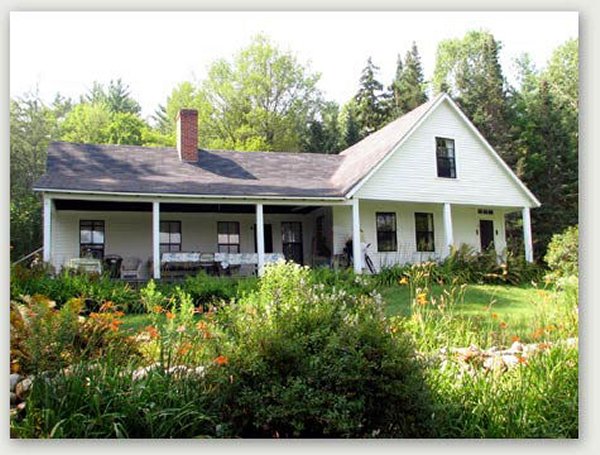




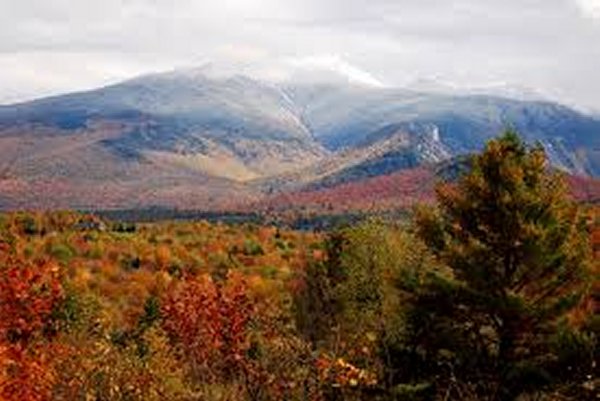
Views of Mt. Lafayette from our cottage up the hill a couple of miles
http://www.trinity.edu/rjensen/tidbits/Mountains/Layfayette01/Lafayette01.htm


When we see the parking lots full of cars in both our popular and
less-popular inns each summer, Erika and I know that the poets are back in the
mountains. For a few weeks each summer, all the area inns are brimming full of
poets who descend on Franconia's Robert Frost Place to read their poems and have
creations critiqued by fellow poets at his former home called the Frost Place
that is now a museum. They read and listen to each others' poems by day and then
rush back to their rooms to rewrite lines over and over each night ---
http://www.frostplace.org/
When Frost arrived in New York, he found a review of his book in a prominent paper. Now an acclaimed new poet, Frost wanted a farm in the mountains of New Hampshire, where he could "live cheap and get Yankier and Yankier." He settled in the town of Franconia and within a year published a third book of poetry. Franconia remained his home for 5 years, although he traveled quite a bit lecturing and teaching. In 1920, the Frosts moved to Shaftsbury, Vermont. Although he was now much more a poet-lecturer, Frost always kept a farm and took it seriously. He had trouble with early frosts in Franconia and required a warmer climate for his apple trees. Frost lived in Shaftsbury for about 20 years. His biographer called it "The Years of Triumph".
Today, The Frost Place is owned by the town of Franconia and used in the summer as a writers' conference. Several rooms are open to the public during the season. Programs are given to commemorate the poet.
http://www.frostfriends.org/franconia.html
Robert Frost only lived up here for about five years 1915-1920.
In those years he found the White Mountain winters too harsh for his apple trees
and other garden plants. He moved to Vermont to find a milder climate for his
gardening and a college teaching post. For 42 years beginning in 1921
he taught poetry at Vermont's Middlebury College in the Summer and Fall terms.
The Frost Place in these White Mountains is where he lived in five of his most
creative years.
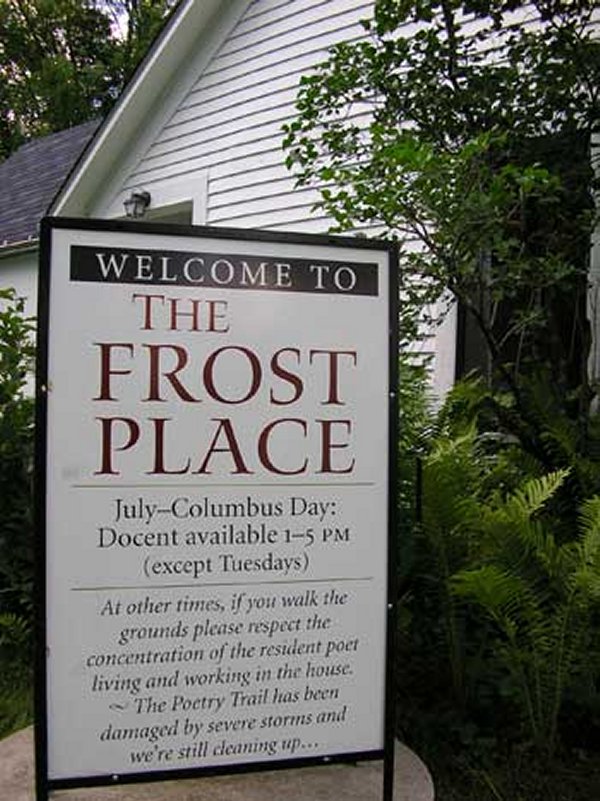




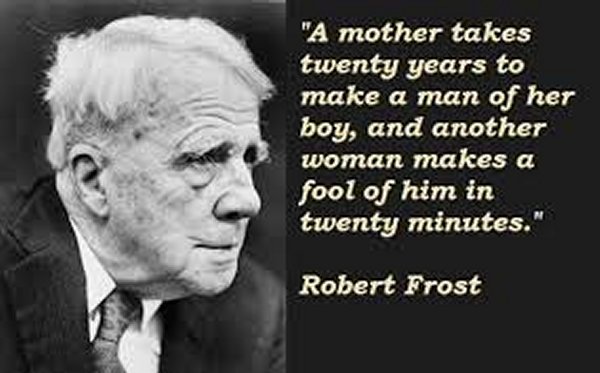
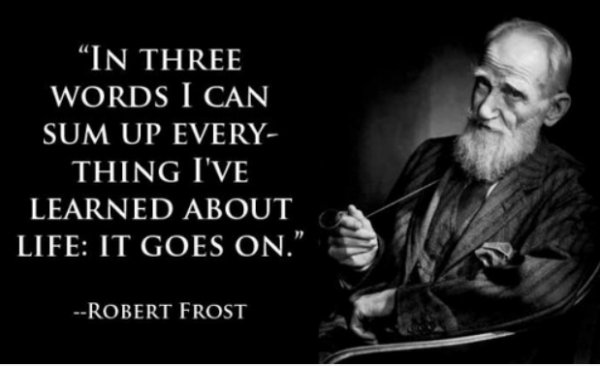

Before moving to the White Mountains up north, Frost lived for
a short time in a farm given
to him by his grandfather in Derry, New Hampshire
The "L-Style" of buildings is very common for farms throughout New England
This allows tending to livestock without having to go outdoors during blizzards.
After living in the White Mountains for five years, Frost and
his family moved to Vermont.
This is the Frost Stone House Museum in Shaftsbury, Vermont


Nothing fancy in Vermont or New Hampshire

Robert Frost --- http://en.wikipedia.org/wiki/Robert_Frost
Robert Lee Frost (March 26, 1874 – January 29, 1963) was an American poet. His work was initially published in England before it was published in America. He is highly regarded for his realistic depictions of rural life and his command of American colloquial speech.[2] His work frequently employed settings from rural life in New England in the early twentieth century, using them to examine complex social and philosophical themes. One of the most popular and critically respected American poets of the twentieth century, Frost was honored frequently during his lifetime, receiving four Pulitzer Prizes for Poetry. He became one of America's rare "public literary figures, almost an artistic institution." He was awarded the Congressional Gold Medal in 1960 for his poetical works. On July 22, 1961 Frost was named Poet laureate of Vermont by the state legislature through Joint Resolution R-59 of the Acts of 1961, which also created the position.
. . .
Robert Frost's personal life was plagued with grief and loss. In 1885 when Frost was 11, his father died of tuberculosis, leaving the family with just eight dollars. Frost's mother died of cancer in 1900. In 1920, Frost had to commit his younger sister Jeanie to a mental hospital, where she died nine years later. Mental illness apparently ran in Frost's family, as both he and his mother suffered from depression, and his daughter Irma was committed to a mental hospital in 1947. Frost's wife, Elinor, also experienced bouts of depression.
Elinor and Robert Frost had six children: son Elliot (1896–1904, died of cholera); daughter Lesley Frost Ballantine (1899–1983); son Carol (1902–1940, committed suicide); daughter Irma (1903–1967); daughter Marjorie (1905–1934, died as a result of puerperal fever after childbirth); and daughter Elinor Bettina (died just three days after her birth in 1907). Only Lesley and Irma outlived their father. Frost's wife, who had heart problems throughout her life, developed breast cancer in 1937, and died of heart failure in 1938.
In 1960, was awarded a United States Congressional Gold Medal, "In recognition of his poetry which enabled the culture of the United States and the philosophy of the world,"[12] which was finally bestowed by President Kennedy in March 1962.[13]
Frost was 86 when he read his well-known poem "The Gift Outright" at the inauguration of President John F. Kennedy on January 20, 1961. He died in Boston two years later, on January 29, 1963, of complications from prostate surgery. He was buried at the Old Bennington Cemetery in Bennington, Vermont. His epitaph quotes the last line from his poem, "The Lesson for Today (1942): "I had a lover's quarrel with the world."

Robert Frost --- http://en.wikipedia.org/wiki/Robert_Frost
Some Robert Frost Poems ---
http://en.wikipedia.org/wiki/Robert_Frost#Selected_works
Some Robert Frost Poems ---
http://frost.freehosting.net/poems.htm
And here are a few excerpts from Robert Frost's poems now on the Internet:
| I
shall be telling this with a sigh Somewhere ages and ages hence: Two roads diverged in a wood, and I, I took the one less traveled by, And that has made all the difference Robert Frost, The Road Not Taken |
We raised a simple prayer
Before we left the spot, That in the general mowing That place might be forgot; Or if not all so favored, Obtain such grace of hours, That none should mow the grass there While so confused with flowers. Robert Frost, Rose Pogoni |
But he turned first, and
led my eye to look At a tall tuft of flowers beside a brook, A leaping tongue of bloom the scythe had spared Beside a reedy brook the scythe had bared. Robert Frost, A Tuft of Flowers |
| Ah, when to the heart of
man Was it ever less than a treason To go with the drift of things, To yield with a grace to reason, And bow and accept the end Of a love or a season? Robert Frost, Reluctance |
Whose woods these are I
think I know. His house is in the village though; He will not see me stopping here To watch his woods fill up with snow. My little horse must think it queer To stop without a farmhouse near Between the woods and frozen lake The darkest evening of the year. He gives his harness bells a shake To ask if there is some mistake. The only other sound's the sweep Of easy wind and downy flake. The woods are lovely, dark and deep. But I have promises to keep, And miles to go before I sleep, And miles to go before I sleep. Robert Frost, Stopping by Woods on a Snowy Evening |
We heard, we knew we heard
the brook. A note as from a single place, A slender tinkling fail that made Now drops that floated on the pool Like pearls, and now a silver blade. Robert Frost, Going for Water |
|
'Fred, where is north?' 'North? North is there, my love. The brook runs west.' 'West-running Brook then call it.' (West-Running Brook men call it to this day.) 'What does it think k's doing running west When all the other country brooks flow east To reach the ocean? It must be the brook Can trust itself to go by contraries The way I can with you -- and you with me -- Because we're -- we're -- I don't know what we are. What are we?' 'Young or new?' 'We must be something. We've said we two. Let's change that to we three. As you and I are married to each other, We'll both be married to the brook. We'll build Our bridge across it, and the bridge shall be Our arm thrown over it asleep beside it. Look, look, it's waving to us with a wave To let us know it hears me.' ' 'Why, my dear, That wave's been standing off this jut of shore --' (The black stream, catching a sunken rock, Flung backward on itself in one white wave, And the white water rode the black forever, Not gaining but not losing, like a bird |
White feathers from the struggle of whose breast Flecked the dark stream and flecked the darker pool Below the point, and were at last driven wrinkled In a white scarf against the far shore alders.) 'That wave's been standing off this jut of shore Ever since rivers, I was going to say,' Were made in heaven. It wasn't waved to us.' 'It wasn't, yet it was. If not to you It was to me -- in an annunciation.' 'Oh, if you take it off to lady-land, As't were the country of the Amazons We men must see you to the confines of And leave you there, ourselves forbid to enter,- It is your brook! I have no more to say.' 'Yes, you have, too. Go on. You thought of something.' 'Speaking of contraries, see how the brook In that white wave runs counter to itself. It is from that in water we were from Long, long before we were from any creature. Here we, in our impatience of the steps, Get back to the beginning of beginnings, The stream of everything that runs away. Some say existence like a Pirouot And Pirouette, forever in one place, Stands still and dances, but it runs away, It seriously, sadly, runs away |
To fill the abyss' void with emptiness. It flows beside us in this water brook, But it flows over us. It flows between us To separate us for a panic moment. It flows between us, over us, and with us. And it is time, strength, tone, light, life and love- And even substance lapsing unsubstantial; The universal cataract of death That spends to nothingness -- and unresisted, Save by some strange resistance in itself, Not just a swerving, but a throwing back, As if regret were in it and were sacred. It has this throwing backward on itself So that the fall of most of it is always Raising a little, sending up a little. Our life runs down in sending up the clock. The brook runs down in sending up our life. The sun runs down in sending up the brook. And there is something sending up the sun. It is this backward motion toward the source, Against the stream, that most we see ourselves in, The tribute of the current to the source. It is from this in nature we are from. It is most us.' 'To-day will be the day....You said so.' 'No, to-day will be the day You said the brook was called West-running Brook.' 'To-day will be the day of what we both said.') |
Jensen Comment
There are two extremes in poetry. At one extreme we have poems that are
perfectly structured ( e.g.,
iambic pentameter,
iambic tetramete, or
trochaic meter) but have uncreative content. This is like the band making
lousy music while marching in perfect step. At the other extreme we have lazy
poems in free form that have a message that is nothing more than prose in short
lines. Good poets like Shakespeare and Robert Frost could meter the lines and still have a
message. This is very, very difficult even for the professional poets and is
seldom truly appreciated by the untrained readers just as a great symphony is
not supremely appreciated by untrained listeners. I've never been able to fully
appreciate "modern" art and free-form poetry, although I sometimes like the
color patterns and prose messages.
"Scared Straight — by Poetry?" by Doug Lederman, Inside Higher Ed, June 4, 2008 --- http://www.insidehighered.com/news/2008/06/04/frost
Jay Parini has taught poetry to many, many students during his 30-plus years of college teaching. But the group of teenagers for whom he has read and analyzed Robert Frost’s poems in recent weeks are unlike the young people he has encountered in the classrooms of Dartmouth and Middlebury Colleges since 1975.
“To them, Robert Frost is just a name on a plaque,” said Parini, a poet, novelist and biographer of Frost. “I can’t assume a damn thing that they have any knowledge at all” about Frost or poetry.
Parini’s students these last two weeks have not had much of a choice but to listen to the Middlebury professor. Their attendance in the two sessions, the second of which was Tuesday, was mandatory as part of a “court diversion” program they entered in lieu of going to jail. Their crime: trashing a Vermont home in which Frost summered for the last two decades of his life, as a party they held raged out of control. The high school students, who were invited to the Homer Noble Farm, an unheated farmhouse in Ripton, Vt., by a youthful former employee of Middlebury College, which owns the structure, burned furniture to keep warm, broke china and soiled the carpets. They did more than $10,000 in damage.
The local prosecutor, Addison County State’s Attorney John Quinn, contemplated sending them to jail. But he opted instead for a more creative punishment. “I guess I was thinking that if these teens had a better understanding of who Robert Frost was, and his contribution to our society, that they would be more respectful of other people’s property in the future and would also learn something from the experience,” he told the Associated Press.
Quinn’s call to Parini suggesting that he teach the wrongdoers about Frost caught the author and poet by surprise, but he embraced the idea. In two sessions, Parini said he “tried to take it down to brass tacks ... just reading some very moving Frost poems,” rather than trying to beat the young people over the head with lectures. ("I had three teenagers of my own,” he said.)
“Out Out,” which describes a teenage farmhand’s loss of his hand, seemed to resonate with the high schoolers who themselves hail mostly from farm country, Parini said. And as he read from the seemingly inevitable “The Road Not Taken,” Parini said, he could not help but suggest to his temporary students that they might be “lost in your own woods.”
“This was a very moving and emotional experience, and I think I really connected emotionally with these kids,” Parini said. “The goal was to show them why poetry matters in their lives. That it’s not just some monument on a hillside, but it has very crucial and vital things ot say about their very own lives.”
Views of Mt. Lafayette from our cottage up
the hill a couple of miles
http://www.trinity.edu/rjensen/tidbits/Mountains/Layfayette01/Lafayette01.htm
Our cottage's history ---
http://www.trinity.edu/rjensen/tidbits/CottageHistory/Hotel/Brochure/Brochure1900.htm
More of Bob Jensen's Pictures and
Stories
http://www.trinity.edu/rjensen/Pictures.htm
On May 14,
2006 I retired from
Trinity University after a long and
wonderful career as an accounting professor in four universities. I was
generously granted "Emeritus" status by the Trustees of Trinity University. My
wife and I now live in a cottage in the White Mountains of New Hampshire ---
http://www.trinity.edu/rjensen/NHcottage/NHcottage.htm
Bob
Jensen's Blogs ---
http://www.trinity.edu/rjensen/JensenBlogs.htm
Current and past editions of my newsletter called New
Bookmarks ---
http://www.trinity.edu/rjensen/bookurl.htm
Current and past editions of my newsletter called
Tidbits ---
http://www.trinity.edu/rjensen/TidbitsDirectory.htm
Current and past editions of my newsletter called
Fraud Updates ---
http://www.trinity.edu/rjensen/FraudUpdates.htm
Bob Jensen's past presentations and lectures
---
http://www.trinity.edu/rjensen/resume.htm#Presentations
Our
address is 190 Sunset Hill Road, Sugar Hill, New Hampshire
Our cottage was known as the Brayton Cottage in the early 1900s
Sunset Hill is a ridge overlooking with
New Hampshire's White Mountains to the East
and Vermont's
Green Mountains to the West
Bob Jensen's Threads --- http://www.trinity.edu/rjensen/threads.htm
Bob Jensen's Home Page --- http://www.trinity.edu/rjensen/